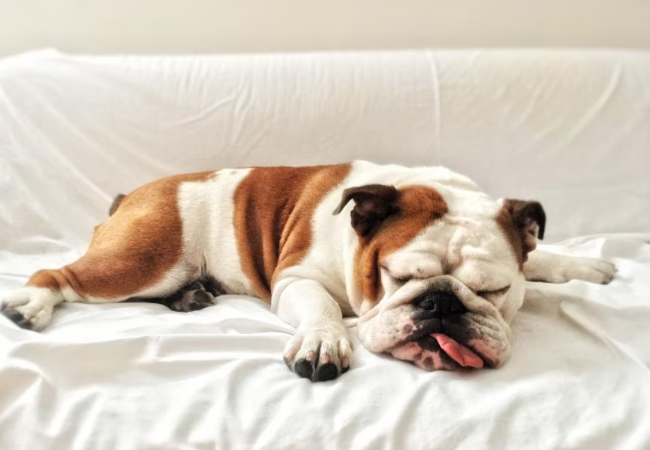Snoring in Dogs: Vet’s 2025 Guide to Causes, Concerns & Solutions 💤🐶

In this article
Snoring in Dogs: Vet’s 2025 Guide to Causes, Concerns & Solutions 💤🐶
By Dr. Duncan Houston BVSc
Hello—I’m Dr Duncan Houston BVSc, veterinarian and Ask A Vet founder. If your dog snores, it's often just a harmless quirk, but sometimes it can signal a health issue. In this vet‑approved guide, we’ll explore:
- Common and anatomical causes
- When snoring is normal vs. worrisome
- Health conditions linked to snoring
- How to reduce snoring at home
- When veterinary attention is needed
1. Breed & Anatomy
Brachycephalic breeds—Bulldogs, Pugs, Boxers, Shih‑Tzus, Boston Terriers—have compressed airways, elongated soft palates, and narrow nostrils, making snoring extremely common.
2. Sleeping Position & Weight
Back‑sleeping may let the tongue and throat tissues fall back, causing snoring.
- Weight gain adds throat fat and worsens snoring—helped by weight loss.
- Senior dogs lose throat muscle tone, increasing snoring.
3. Allergies & Respiratory Inflammation
Nasal or sinus inflammation from allergies causes congestion and stertor (heavy snoring).
- Environmental triggers include pollen, dust, smoke—humidifiers and HEPA filters can help.
- Respiratory infections (bacterial or fungal) may also cause loud snoring.
4. Dental & Oral Health Issues
An abscessed tooth or oral mass can swell and block airway passages, leading to snoring.
5. Airway Obstructions & Serious Causes
Foreign bodies, nasal or pharyngeal growths, laryngeal paralysis, tracheal collapse, or sleep apnea may manifest as persistent snoring and stertor.
These concerns warrant thorough veterinary examination and imaging.
6. When Snoring Is Probably Normal
- Mild snoring only during deep sleep, especially in back sleepers of normal weight
- No other symptoms like nasal discharge, coughing, lethargy, or breathing difficulty.
7. Red Flags That Require Vet Care
- Sudden onset or loud new snoring
- Accompanied by nasal discharge, sneezing, and coughing
- Breathing difficulties, blue‑tinged gums, exercise intolerance.
- Evidence of oral pain or mass
8. How to Reduce Snoring & Support Airflow
- 🎯 Encourage side or stomach sleeping—offer supportive bedding
- ⚖️ Manage weight with exercise and diet
- 🧼 Use HEPA filters and wipe paws/fur to reduce allergens
- 💧 Maintain humidity and avoid smoke or dust irritants
- 🦷 Keep up dental check‑ups to catch abscesses early
9. When Vet Intervention Helps
- Manage BOAS: stenotic nares, soft palate resection, laryngeal correction surgeries.
- Treat any infection, remove foreign bodies, and biopsy masses
- Correct dental issues like abscesses
- Provide oxygen or breathing support when needed
📌 Final Thoughts from a Vet
Most snoring dogs are simply comfy sleepers—but changes in pattern, intensity, or accompanying symptoms may signal bigger issues. Monitor snoring, weight, and behavior. Use home remedies like position changes and humidity. And don't hesitate to reach out—Ask A Vet is here with tools for sleep logs, allergy tracking, weight plans, and airway assessments to help your pup breathe easier tonight and every night. 🐾❤️






